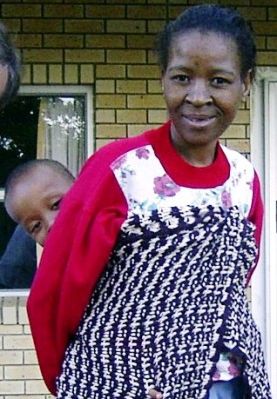The story of Thandi and her son Bhekithemba should give you an impression of the terrible situation of many people in our area and show you how we help people in a meaningful and effective way:
Thandi is a 31-year-old mother with no education and unemployed. She lives in a rural area about 35 km away from Mandeni and is insanely happy when her boyfriend comes from Durban to visit her. When Sipho walks in the door, Thandi immediately senses that something is wrong. She tries to find out what is bothering him, but he gives her no answer. That night she comforts him and becomes pregnant, not realising that she has put herself in serious danger. The whole time Sipho is with her, she has an uneasy feeling but cannot see what the difficulty is. Thandi questions Sipho about his life in Durban, where he works, and concludes that he lives there with another woman and possibly has one or two children. Finally, he confesses that he cheated on her with another woman. All his promises to pay the lobola, the bride price, for her dissolve - and with them the hope of marriage: in one fell swoop she has no future to look forward to. Her family is also very disappointed. Sipho drives away to Durban, never wanting to return to Thandi. She is devastated. After about two months, Thandi's gnawing suspicions are confirmed as the nurse at the hospital tells her that she is pregnant. At the same time, the nurse takes the routine blood test. Thandi turns out to be HIV-negative. A feeling of relief flows through Thandi. But this does not last, because at the next pregnancy check-up, the nurse does another blood test, and this time it turns out that Thandi is HIV-positive. The feelings of despair, anguish and disappointment are almost unbearable. Then the nurse assures her that there is a possibility that her baby will not necessarily be infected with HIV. The months pass and Thandi's love for the little baby she carries under her heart grows. At birth, her little boy looks healthy. She gives him the name Bhekithemba. Over the course of four years, Thandi begins to show symptoms of AIDS. She weakens, loses weight, develops pulmonary tuberculosis and Kaposi's sarcoma (an AIDS-related skin cancer),
and Bhekithemba is also now tested as HIV positive and also gets pulmonary TB. They live in their parents' kraal (a rural Zulu dwelling made up of several mud huts), but the family has completely shunned them. They deny her access to the shared family hut and isolate her in her own remote little hut. The other children are forbidden to play with Bhekithemba. Thandi and Bhekithemba are both lonely and dejected. Because they are too sick to fend for themselves, they are provided with food; namely, one child puts a bowl on the floor, pushes it under the door and then runs away. Like the "unclean leper" from the Bible, they are completely abandoned. There is no water to drink or wash in and no toilet. One can only imagine how Thandi must suffer from the humiliation and undignified treatment. Her own family disowns her and treats her worse than the goats and dogs outside! Somehow the social workers hear about Thandi and Bhekithemba's plight. They visit the kraal and discover the disgusting and inhumane conditions the two are subjected to. The social worker approaches Blessed Gérard's Care Centre, which does not hesitate to prepare a place for both Thandi and Bhekithemba. The next day, the social worker takes them to the hospice. They are weak, dirty and desperate. Thandi is now in a hospital room with eight other women whose health is even worse than hers. Bhekithemba's condition improves tremendously because he is given a lot of good food and all the necessary medicines so that he can be transferred to Blessed Gerard's Children's Home within a week. He participates in pre-school education with the other children and visits his mother every afternoon. The social worker wants Thandi's relatives to visit her daughter and grandson at Blessed Gerard's Hospice and be educated about HIV/AIDS, which they fear to such an irrational degree, but they continue to refuse to come. Thandi has given up hope that her family will take her back home. She is devastated that none of her relatives bother to visit her. She has given up on herself and becomes depressed. She refuses to eat and loses even more weight. She asks us to take her son into our children's home when she dies. The medical staff and the nurses try their best to get her out of this depression. But it does not help. Thandi gets headaches and sleeps more and more. The medicines she gets from the doctor don't help either. So we decide to transfer her to the hospital. She never returns to the hospice. She dies in the hospital of tuberculosis and meningitis, leaving her young son behind. How are we going to teach Bhekithemba that his mother will never return? How are we to tell the family that they should take care of the little boy? We contact the family through the social worker. They are not interested and even refuse to bury Thandi. They even don't want to know about Bhekithemba, who should stay with us until he dies. Bhekithemba obviously does not have long to live. Nevertheless, he continues to go to the kindergarten with the other children. We treat all his opportunistic infections and care for him lovingly and that is what he needs the most.
* This is a true story only the names have been changed for privacy reasons.
